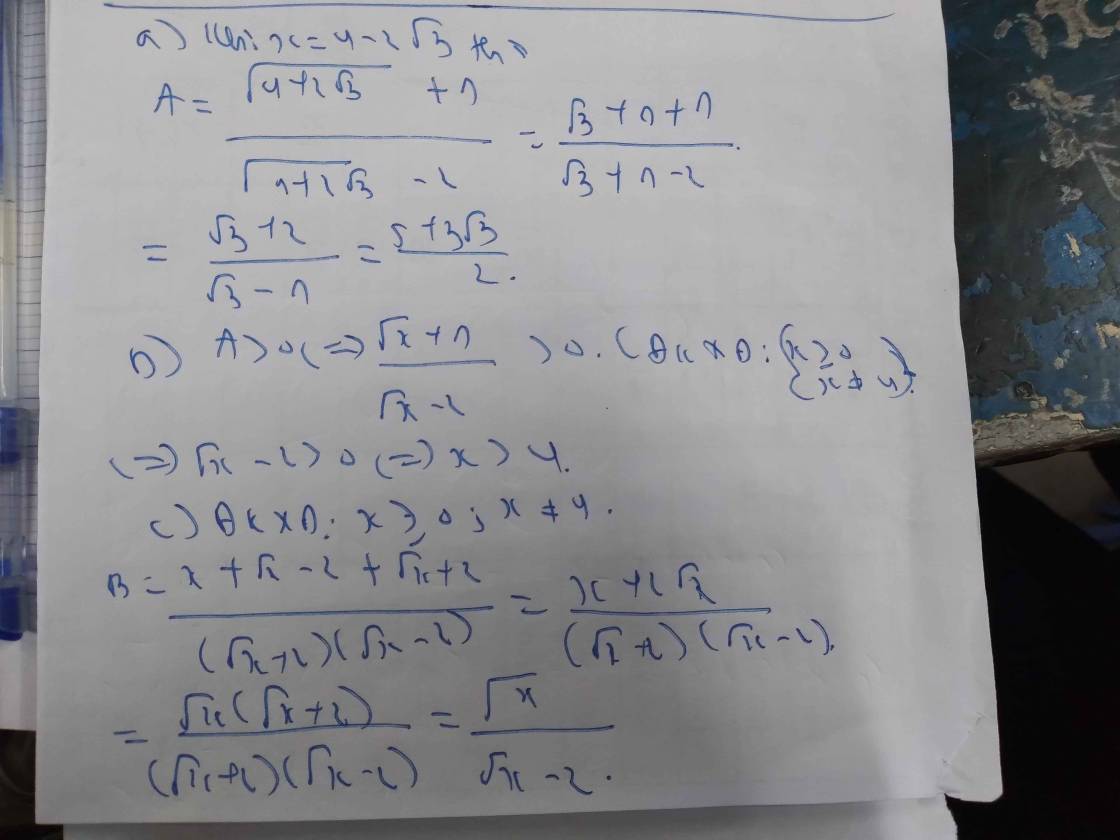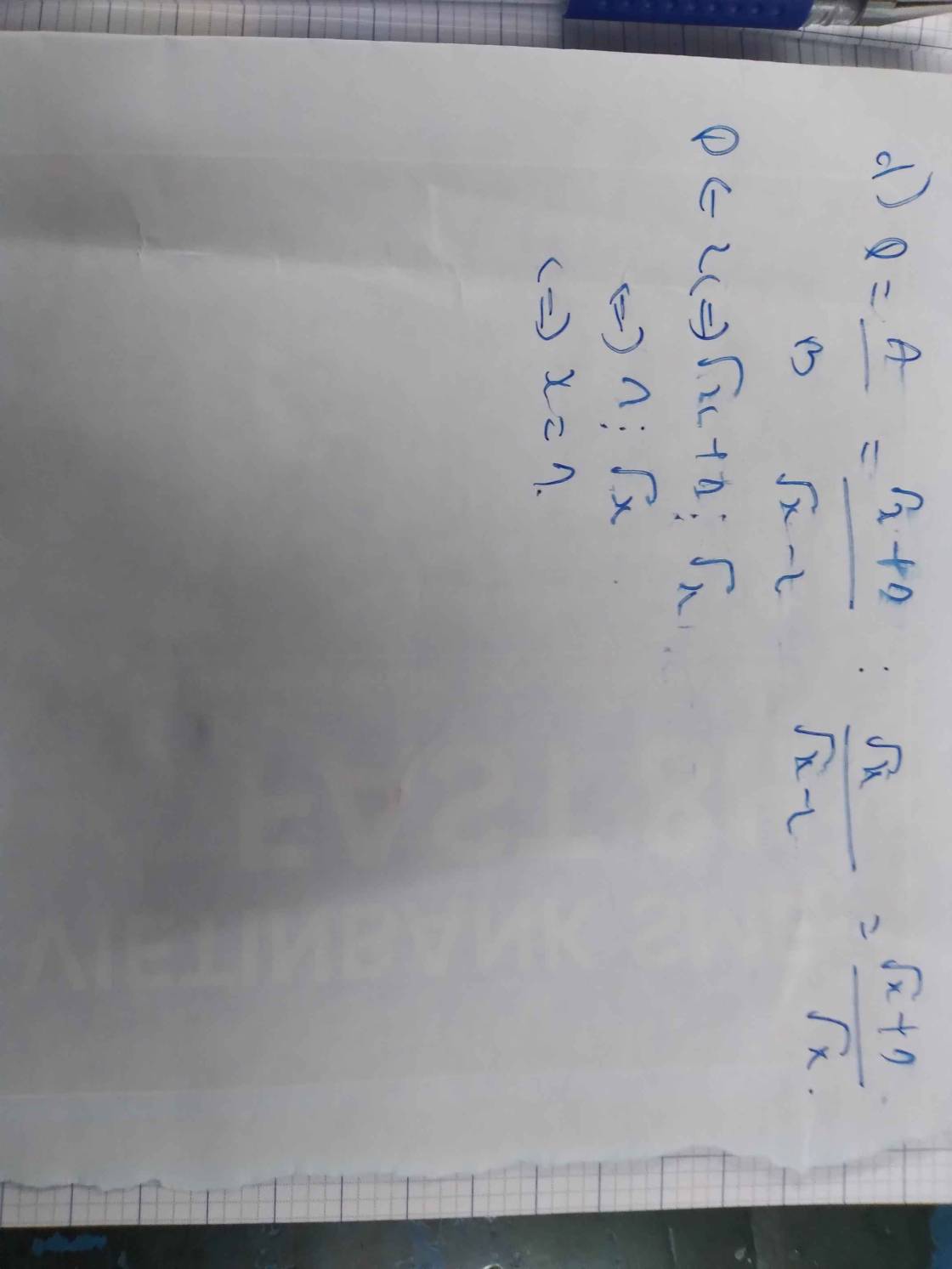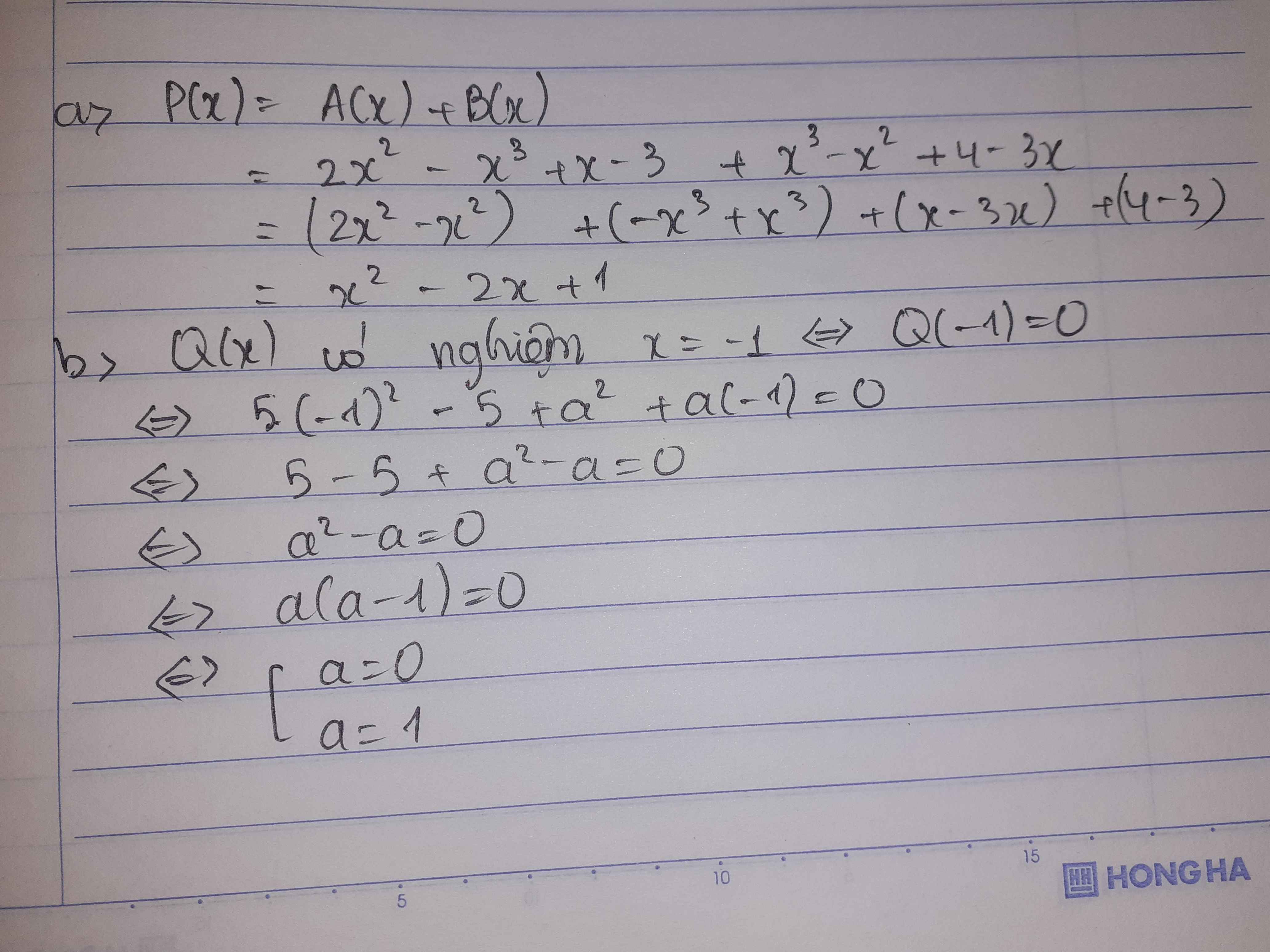Cho a+\(\sqrt[3]{2}\)+2 và đa thức P(x)+(x-3)(x-1)\(^3\)Tính giá trị của P(a)

Những câu hỏi liên quan
1. Cho biểu thức Afrac{sqrt{x}-5}{sqrt{x}+3}a) Tính giá trị của A tại xfrac{1}{4}b) Tính giá trị của x để A -1c) Tính giá trị nguyên của x để A nhận giá trị nguyên.2. a) Tìm x biết: sqrt{7-x}x-1b) Tính tổng M1+left(-2right)+left(-2right)^2+...+left(-2right)^{2006}c) Cho đa thức: fleft(xright)5x^3+2x^4-x^2+3x^2-x^3-x^4+1-4x^3Chứng tỏ rằng đa thức trên không có nghiệm.
Đọc tiếp
1. Cho biểu thức \(A=\frac{\sqrt{x}-5}{\sqrt{x}+3}\)
a) Tính giá trị của A tại \(x=\frac{1}{4}\)
b) Tính giá trị của x để A = -1
c) Tính giá trị nguyên của x để A nhận giá trị nguyên.
2. a) Tìm x biết: \(\sqrt{7-x}=x-1\)
b) Tính tổng \(M=1+\left(-2\right)+\left(-2\right)^2+...+\left(-2\right)^{2006}\)
c) Cho đa thức: \(f\left(x\right)=5x^3+2x^4-x^2+3x^2-x^3-x^4+1-4x^3\)
Chứng tỏ rằng đa thức trên không có nghiệm.
lop 7 lam gi co nghiem voi da thuc ha ban
Đúng 0
Bình luận (0)
Cho biểu thức
\(A=\left(\frac{x-3\sqrt{x}}{x-9}\right):\left(\frac{1}{x+\sqrt{x}-6}+\frac{\sqrt{x}-3}{\sqrt{x}-2}-\frac{\sqrt{x}-2}{\sqrt{x}+3}\right)\)
1. Rút gọn biểu thức A
2. Tính giá trị của A tại \(x=\frac{25}{16}\)
3. Với giá trị nào của x thì biểu thức A nhận giá trị âm
4. Tính giá trị của A sau khi \(x=\sqrt{7-2\sqrt{6}}+3\)
ĐK: \(x-9\ne0\Rightarrow x\ne9\)
\(\sqrt{x}\ge0\Rightarrow x\ge0\)
\(x+\sqrt{x}-6\ne0\Rightarrow x+3\sqrt{x}-2\sqrt{x}-6\ne0\Rightarrow\left(\sqrt{x}-2\right)\left(\sqrt{x}+3\right)\ne0\)
\(\Rightarrow\sqrt{x}-2\ne0\Rightarrow\sqrt{x}\ne2\Rightarrow x\ne4\)
ĐKXĐ: \(x\ge0;x\ne4;x\ne9\)
\(A=\left(\frac{x-3\sqrt{x}}{x-9}\right):\left(\frac{1}{x+\sqrt{x}-6}+\frac{\sqrt{x}-3}{\sqrt{x}-2}-\frac{\sqrt{x}-2}{\sqrt{x}+3}\right)\)
\(=\frac{\sqrt{x}\left(\sqrt{x}-3\right)}{\left(\sqrt{x}-3\right)\left(\sqrt{x}+3\right)}:\left(\frac{1}{\left(\sqrt{x}-2\right)\left(\sqrt{x}+3\right)}+\frac{\sqrt{x}-3}{\sqrt{x}-2}-\frac{\sqrt{x}-2}{\sqrt{x}+3}\right)\)
\(=\frac{\sqrt{x}}{\sqrt{x}+3}:\left(\frac{1+\left(\sqrt{x}-3\right)\left(\sqrt{x}+3\right)-\left(\sqrt{x}-2\right)\left(\sqrt{x}-2\right)}{\left(\sqrt{x}-2\right)\left(\sqrt{x}+3\right)}\right)\)
\(=\frac{\sqrt{x}}{\sqrt{x}+3}:\frac{1+x-9-x+4\sqrt{x}-4}{\left(\sqrt{x}-2\right)\left(\sqrt{x}+3\right)}\)
\(=\frac{\sqrt{x}}{\sqrt{x}+3}.\frac{\left(\sqrt{x}-2\right)\left(\sqrt{x}+3\right)}{4\sqrt{x}-12}\)
\(=\frac{\sqrt{x}\left(\sqrt{x}-2\right)}{4\left(\sqrt{x}-3\right)}\)
2, Với \(x=\frac{25}{16}\)\(\Rightarrow\sqrt{x}=\sqrt{\frac{25}{16}}=\frac{5}{4}\)
\(A=\frac{\frac{5}{4}\left(\frac{5}{4}-2\right)}{4\left(\frac{5}{4}-3\right)}=\frac{5}{4}.\left(-\frac{3}{4}\right):4\left(-\frac{7}{4}\right)=-\frac{15}{16}:-7=\frac{15}{112}\)
\(\orbr{\begin{cases}\orbr{\begin{cases}\\\end{cases}}\\\end{cases}}\)\(\orbr{\begin{cases}\orbr{\begin{cases}\sqrt{x}-2< 0\\\sqrt{x}-3>0\end{cases}\Rightarrow\orbr{\begin{cases}\sqrt{x}< 2\\\sqrt{x}>3\end{cases}}\Rightarrow\orbr{\begin{cases}x< 4\\x>9\end{cases}}}\\\orbr{\begin{cases}\sqrt{x}-2>0\\\sqrt{x}-3< 0\end{cases}\Rightarrow\orbr{\begin{cases}\sqrt{x}>2\\\sqrt{x}< 3\end{cases}\Rightarrow\orbr{\begin{cases}x>4\\x< 9\end{cases}}}}\end{cases}}\)
Đúng 0
Bình luận (0)
Cho hai biểu thức A= \(\dfrac{\sqrt{x}+1}{\sqrt{x}-2}\)và B= \(\dfrac{x}{x-4}+\dfrac{1}{\sqrt{x}+2}-\dfrac{1}{2-\sqrt{x}}\)
a) Tính giá trị của A khi x= 4-\(2\sqrt{3}\)
b) Tìm x để A>0
c) Rút gọn B
d) Tìm giá trị nguyên của x để giá trị của biểu thức A: B nguyên
Bài 1 Cho hai đa thức :
A(x)=\(2x^3+2-3x^2+1\)
B(x)=\(2x^2+3x^3-x-6\)
a)Xác định bậc của đa thức A(x) và B(x)
b) Tính giá trị của đa thức A(x) tại x =2
c) Tính A(x)+B(x); A(x)-B(x)
a) \(A\left(x\right)=2x^3+2-3x^2+1=2x^3-3x^2+3\)
Có bậc là 3
\(B\left(x\right)=2x^2+3x^3-x-6=3x^3+2x^2-x-6\)
Có bậc 3
b) Thay \(x=2\) vào A(x) ta được:
\(2\cdot2^3-3\cdot2^2+3=2\cdot8-3\cdot4+3=16-12+3=7\)
Vậy giá trị của A(x) tại x=2 là 7
c) \(A\left(x\right)+B\left(x\right)\)
\(=2x^3-3x^2+3+3x^3+2x^2-x-6\)
\(=5x^3-x^2-x-3\)
\(A\left(x\right)-B\left(x\right)\)
\(=\left(2x^3-3x^2+3\right)-\left(2x^2+3x^3-x-6\right)\)
\(=2x^3-3x^2+3-2x^2-3x^3+x+6\)
\(=-x^3-5x^2+x+9\)
Đúng 2
Bình luận (0)
a: A(x)=2x^3-3x^2+3
Bậc là 3
B(x)=3x^3+2x^2-x-6
Bậc là 3
b: A(2)=2*2^3-3*2^2+3=7
c; A(x)+B(x)
=2x^3-3x^2+3+3x^3+2x^2-x-6
=5x^3-x^2-x-3
A(x)-B(x)
=2x^3-3x^2+3-3x^3-2x^2+x+6
=-x^3-5x^2+x+9
Đúng 0
Bình luận (0)
`@` `\text {Ans}`
`\downarrow`
`1,`
`a)`
`A(x)=2x^3 +2 - 3x^2 + 1`
Bậc của đa thức: `3`
`B(x) = 2x^2 + 3x^3 - x - 6`
Bậc của đa thức: `3`
`b)`
Thay `x=2` vào đa thức `A(x)`
`2*2^3 +2 - 3*2^2 + 1`
`= 2^4 + 2 - 12 + 1`
`= 16 + 2 - 12 + 1`
`= 16 - 10 + 1`
`= 6 + 1`
`= 7`
Vậy, giá trị của `A(x)` tại `x=2` là `A(2)=7`
`c)`
`A(x)+B(x)`
`= (2x^3 +2 - 3x^2 + 1)+(2x^2 + 3x^3 - x - 6)`
`= 2x^3 +2 - 3x^2 + 1+2x^2 + 3x^3 - x - 6`
`= (2x^3 + 3x^3) + (-3x^2 + 2x^2) - x + (2+1-6)`
`= 5x^3 - x^2 - x - 3`
`A(x) - B(x)`
`=(2x^3 +2 - 3x^2 + 1)-(2x^2 + 3x^3 - x - 6)`
`= 2x^3 +2 - 3x^2 + 1-2x^2 - 3x^3 + x + 6`
`= (2x^3 - 3x^3) + (-3x^2 - 2x^2) + x + (2 + 1 + 6)`
`= -x^3 - 5x^2 + x + 9`
Đúng 2
Bình luận (0)
Xem thêm câu trả lời
cho 2 đa thức: A(x) = 2x^2- x^3+x- 3
B(x) = x^3-x^2 +4-3x
a, tính giá trị P(x)= A(x)+ B(x)
b, cho đa thức Q(x)= 5x^2 - 5 +a^2+ ax. Tìm các giá trị của a để Q(x) có nghiệm x= -1
a) A(x)+B(x)=2x2-x3+x-3+x3-x2+4-3x
A(x)+B(x)=1x2-2x+1
Đúng 1
Bình luận (0)
a) Ta có: P(x)=A(x)+B(x)
\(=2x^2-x^3+x-3+x^3-x^2+4-3x\)
\(=x^2-2x+1\)
b) Thay x=-1 vào Q(x), ta được:
\(5\cdot\left(-1\right)^2-5+a^2+a\cdot\left(-1\right)=0\)
\(\Leftrightarrow a^2-a=0\)
\(\Leftrightarrow a\left(a-1\right)=0\)
\(\Leftrightarrow\left[{}\begin{matrix}a=0\\a=1\end{matrix}\right.\)
Đúng 1
Bình luận (0)
cho biểu thức A left(frac{x-3sqrt{x}}{x-9}-1right):left(frac{9-x}{x+sqrt{x}-6}+frac{sqrt{x}-3}{sqrt{x}-2}-frac{sqrt{x}+2}{sqrt{x}+3}right)( Với x lớn hơn hoặc bằng 0; x khác 2 và 9)a) Rút gọn biểu thức Ab) Với giá trị nào của x thì A có giá trị 1/2c) tính giá trị cuả A tại x 19-8sqrt{3}d) tính số nguyên X để biểu thức A có giá trị là số nguyên ?
Đọc tiếp
cho biểu thức A= \(\left(\frac{x-3\sqrt{x}}{x-9}-1\right):\left(\frac{9-x}{x+\sqrt{x}-6}+\frac{\sqrt{x}-3}{\sqrt{x}-2}-\frac{\sqrt{x}+2}{\sqrt{x}+3}\right)\)
( Với x lớn hơn hoặc bằng 0; x khác 2 và 9)
a) Rút gọn biểu thức A
b) Với giá trị nào của x thì A có giá trị = 1/2
c) tính giá trị cuả A tại x= \(19-8\sqrt{3}\)
d) tính số nguyên X để biểu thức A có giá trị là số nguyên ?
cho 2 biểu thức A=(x+2)/(x) và B=((3)/(x+5))+((20-2x)/(x^2-25))
a,tính giá trị của A khi x=-3, x=\sqrt(-3)^2
b, chứng minh B=((1)/(x-5))
c, Tính giá trị của x để A=B.|x-4|
cho biểu thức A=\(\dfrac{2x+1}{x.\sqrt{x}-1}-\dfrac{\sqrt{x}}{x+\sqrt{x}+1}\) và B=\(\dfrac{1+x.\sqrt{x}}{1+\sqrt{x}}-\sqrt{x}\)
a, tính giá trị của B khi x = \(4-2.\sqrt{3}\)
b, rút gọn biểu thức P=A.B
c,tính giá trị nhỏ nhất của Q=\(\sqrt{x}+\dfrac{1}{P}\)với (x>1)
\(a,B=\dfrac{\left(\sqrt{x}+1\right)\left(x-\sqrt{x}+1\right)}{1+\sqrt{x}}-\sqrt{x}\\ B=x-\sqrt{x}+1-\sqrt{x}=\left(\sqrt{x}-1\right)^2\)
Mà \(x=4-2\sqrt{3}=\left(\sqrt{3}-1\right)^2\)
\(\Rightarrow B=\left(\sqrt{3}-1-1\right)^2=\left(\sqrt{3}-2\right)^2=7-4\sqrt{3}\)
\(b,P=AB=\dfrac{2x+1-x+\sqrt{x}}{\left(\sqrt{x}-1\right)\left(x+\sqrt{x}+1\right)}\cdot\left(\sqrt{x}-1\right)^2\\ P=\dfrac{\left(x+\sqrt{x}+1\right)\left(\sqrt{x}-1\right)}{x+\sqrt{x}+1}=\sqrt{x}-1\\ c,Q=\sqrt{x}+\dfrac{1}{P}=\sqrt{x}+\dfrac{1}{\sqrt{x}-1}\\ Q=\sqrt{x}-1+\dfrac{1}{\sqrt{x}-1}+1\ge2\sqrt{1}+1=3\\ Q_{min}=3\Leftrightarrow\left(\sqrt{x}-1\right)^2=1\Leftrightarrow\left[{}\begin{matrix}\sqrt{x}-1=1\\1-\sqrt{x}=1\end{matrix}\right.\Leftrightarrow\sqrt{x}=2\left(x>1\Leftrightarrow\right)x=4\left(tm\right)\)
Đúng 0
Bình luận (0)
a: \(B=\left(\sqrt{x}-1\right)^2=\left(\sqrt{3}-2\right)^2=7-4\sqrt{3}\)
b: \(A=\dfrac{2x+1-x+\sqrt{x}}{x\sqrt{x}-1}\cdot\left(\sqrt{x}-1\right)^2=\sqrt{x}-1\)
Đúng 0
Bình luận (0)
Cho 2 đa thức; A= 2*x^3+x^2-x+3 và B= x^2 +x
Tìm số nguyên dương x để giá trị của đa thức A chia hết cho giá trị của đa thức B
























